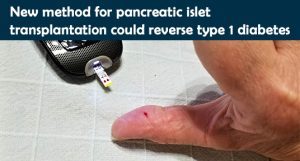|
Getting your Trinity Audio player ready...
|
Researchers at Massachusetts General Hospital have developed a new method for transplanting pancreatic islets that could reverse type 1 diabetes. Current methods involve transplanting islets to the liver, but this is often inefficient and can lead to the loss of up to half of transplanted cells. The researchers used the omentum, the fatty tissue that drapes over the intestines, as an alternative site. They immobilized donor islets onto the omentum using a bio-degradable matrix and then used an immunosuppressive therapy to protect them from attack. The method normalized blood glucose levels and restored insulin secretion in non-human primates with type 1 diabetes. A clinical trial is being planned to test the approach.




